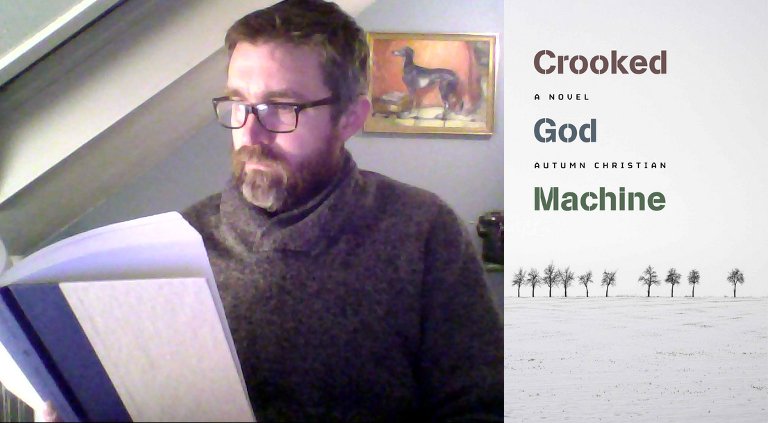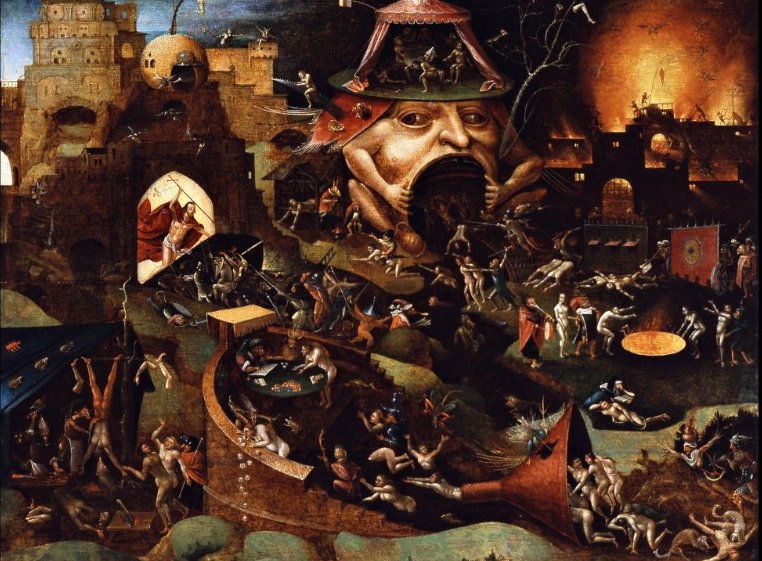Crooked God Machine is an unrelenting, non-stop trip through Dante's Inferno rendered by the sadistic, hallucinatory brush of Hieronymus Bosch. It's not an easy book to read. Just as Bosch's work mesmerizes as it disgusts us, Crooked God Machine has a lurid charm which keeps you turning pages to discover the next terrifying vision, and the next. It's also got a good-hearted, everyman protagonist who somehow refuses to despair.
My father was a paranoid schizophrenic. I never got to know him. But he left behind some writing, including a few pages that described how the universe came apart and inverted and turn into something horrifying and unrecognizable. I imagine the sense of dread and persecution he felt in such a place might be similar to what the characters feel living under Autumn Christian's (our own @snowmachine's) Crooked God Machine.

Christian describes a world in which God is made real through technology - but it's a technology that's advanced to the point that the public doesn't understand it. Unfortunately, those in control of the technology are using it to literally create Hell on Earth.
God speaks to the public through the television. Plague machines scour the landscape, manufacturing flood, drought, and pestilence. Monsters dwell in the wilderness, ready to torture and devour anyone who leaves the relative "safety" of their controlled communities. And if God and his prophets decide that someone is a sinner, they'll be rounded up by the Hell Shuttles and taken away to be tortured and tormented for the rest of their days. Is it any wonder that so many people give up hope and go to "slip clinics" to have metallic spiders inserted in their brains that turn off their self-awareness?
Last week I wrote a post about how we might be living under an artificial God, but this was not the sort of God I was thinking about. Still, it's worth considering - as we create the tools that give us control over our information and environment, and as the power of those tools increases to the point where the god-like becomes commonplace, how can we be certain that our technology will bring the best visions for mankind, and not the worst?
The 20th century saw it's share of horror with the first wave of modern technology. Just how much worse would the concentration camps have been, if capable minds had leveraged all the technology we have today towards making them even worse. What if God told people that suffering was merited, and it was virtuous to increase that suffering as much as possible for as many as possible? What if people believed it?

Christ in Limbo painted by Dutch artist Hieronymus Bosch about 1575
The killing fields, the gas chambers, the medical experiments of Dr. Mengele - we have tools available today that could make those all look like a summer picnic.
We don't want to believe this is true. We don't want to consider that we could do these things again, and that we have the tools to do them even more effectively. We don't want to think about it. So we don't.
And that's the problem. It could happen. It could be happening now. Once it started, we'd never see it. Just as the Germans didn't see the concentration camps in their own backyards.
As one of the book's prophets explains:
The human brain has the unique ability to doubt the reality presented to itself. To comprehend the dissonance between ideas and the trugh of the surrounding world. God knows this, and it infuriates him. It terrifies him....
From the moment we are born we are forced into fear. Even the prophets and saints, even the high priests. A human in fear can be easily manipulated.
Christian is a fantastic stylist. She renders moments of quiet intimacy and visceral horror with precise, detached observation that make both more real. Take this passage from the first page:
When Sissy and I were small and baby brother hadn't yet started to eat his fingers Daddy picked us up and held us above his head so we could fly. He had an indomitable body that seemed to be the only support that kept our rickety, dark-creak house from falling into the swamp. He filled every room he entered to full capacity. I can still see the mark above the kitchen door where he once hit his head.
So much horror and affection, dread and nostalgia all wrapped up into a couple of sentences.
This detachment and casual acceptance of violence becomes more remarkable as you proceed through the book. It shows that the characters have accepted this world, where the most horrifying atrocities are commonplace. And it also provides for a dramatic character arc when the protagonist wakes up to the fact that things haven't always been this way, and probably, they shouldn't.
"Two members of the Apocalypse Brigade came over tonight," I said. "I think they're onto me."
"Why? What did you do?" Leda asked.
"I'm sure I've done something."
Later, when he is enslaved in a slaughterhouse, the same character says, "We shouldn't have to live in a world where we drive ourselves crazy just to survive." It's a hell of a realization. And yet, what are we doing today? Pumping our kids full of mood-medications and setting them up for a lifetime of state-sponsored addiction. We're making them crazy in order to survive. Why?
This is a book dripping in Old-Testament, vengeful-God blood. But it also feels remarkably current, with it's surveillance state, drug culture, and the psychological pressures to conform and perform tortures when instructed by authority.
One of the most chilling passages in the book is the canonization of "Slim Sarah," a mother of 12 who is asked by God to prove her faith with a sacrifice worthy of Abraham. I don't want to spoil it with any more details, but it's her willingness to consider this act which shows just how far the fear has spread, and just how quickly we can all become complicit in the violence of the state, especially when it's backed by the authority of a God.
I think Roberto Bolano tried to touch on this sort of horror in the long middle of 2666. In that long part of that long book, he numbs the reader with one dead woman after another, dozens of them over several hundred pages. It's impossible to remember all the bodies, all the circumstances and the names.
I think Christian's a lot more efficient with this book. After all, she's brought in machines.
I'm recommending this as a powerful book, and as an important book. I think it deserves a place in the discussion of faith, authority, and power. It's also Horror with a capital Aitch. I can still here the grinding roar of those plague machines in the back of my imagination.
If my dad's schizophrenic genes ever surface in my mental phenotype and I start to see visions - I just hope that when that happens I'm not thinking about this book.
